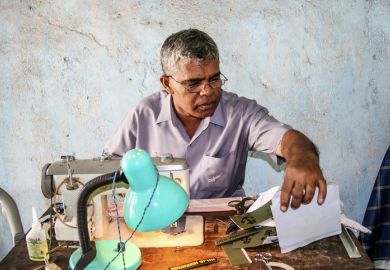Admissions experts have criticised a US university’s decision to revoke scholarships after it inadvertently offered more funding than it had budgeted for.
The University of Texas at Tyler found that it had offered more four-year full fellowships than were in the institution’s plan and that most of those offered scholarships planned to arrive at Tyler in the autumn.
The university responded by revoking between 50 and 60 such scholarships, even though students were being informed long after many of them committed to Tyler and abandoned other college options. Adding to the turmoil for these students is that most of them are from Nepal, so they were obtaining their student visas on the basis of attending a college that many no longer consider to be within reach. The university declined to confirm that all of those who had scholarships revoked were international students, but said that no Texans had scholarships taken away.
As word about what has happened has spread, many admissions leaders have said that they view UT Tyler's actions as unethical. They note that the students from Nepal are taking to social media to tell their stories, and that others may now view offers from American colleges and universities as something other than trustworthy. As that view spreads, many American colleges could feel an impact.
Admissions officials said that they were simply stunned by UT Tyler's decision.
“What happened on one level is understandable, as almost every US campus is coping with enrolment and budget headaches, including negative reactions from potential international students to recent US rhetoric and policy shifts,” said Jonathan Burdick, vice-provost for enrolment initiatives and dean of college admission at the University of Rochester. But, he added, “In this climate, pulling the rug out from 45 students who have worked their butts off to be prepared for study in a US college is criminal.” About 45 Nepalese students have identified themselves as among those whose scholarships were revoked.
Mr Burdick said: “The buck should stop with the officials who made the offers to figure out how to honour them. If not, there should be accountability at a higher, system-wide level.”
Rochester enrols some students from Nepal, he added, and many need aid. “They are costly on average but also excellent. Their peers benefit from knowing them.”
Some admissions counsellors who work with international students said that Tyler’s decision was already leading to questions that they could not answer from prospective students considering applying to US colleges.
Many colleges, of course, have different policies for international and domestic students, or for in-state and out-of-state students. But these policies are public and do not involve revoking a pledged offer of a scholarship.
The value of the revoked scholarships is just over $27,000 a year for a non-Texas student.
UT Tyler has offered the students whose scholarships have been revoked a $5,000-a-year scholarship and in-state tuition rates for which they would normally not be eligible. The university also has offered refunds on any fees already paid by the scholarship winners who now cannot afford to or do not want to enrol.
Lucas Roebuck, vice-president for marketing and chief communications officer at UT Tyler, said that the university never expected to have as many applicants from Nepal as it had attracted. Historically, he said, the university has had a handful of Nepalese students. When plans for the new full-ride scholarships were announced, the current students apparently contacted friends and family members at home, encouraging them to apply.
Tyler did not have to admit all of them, and the university reviewed applications individually. “We made a mistake,” he said, blaming the admissions decisions on “an administrative oversight”.
The university is honouring 184 full-scholarship offers, including 35 to students from outside the US. This is the first year that the university has offered the full scholarship programme.
“We regret this. It is unfortunate, and it has a real impact,” Mr Roebuck said.
“We have budget realities,” he said, so the university was forced to reconsider the scholarship commitments when it realised the number that had been awarded. He said that the awards being honoured already exceeded budget plans, but Tyler could not afford to go beyond that.
Asked if the lesser scholarship and the refunds were enough to compensate students who were led to believe that they could count on UT Tyler, he said: “All I can say is that we are very regretful. We took a very hard look at our budget options.”
And asked if it was legal to revoke a scholarship offer that students accepted in good faith, Mr Roebuck said, “We would not do anything that was illegal.”
Joan Liu, university adviser at United World College of South East Asia, in Singapore, said that the situation cannot be treated as just another budget glitch.
“UT Tyler’s actions perpetuate the growing perception that US universities do not welcome international students. UT Tyler's decision to cancel full scholarships may jeopardise the entire admissions profession,” she said.
The students who saw scholarships disappear are being forced into “a new version of the admissions Hunger Games, where kids will be forced to compete against each other if any last-minute opportunities come up”.
Ms Liu added: “The timing, scope and damage done to international students by a US institution is unprecedented. It cannot be overstated how remarkable this is.”
This is an edited version of a story that first appeared on Inside Higher Ed.
Register to continue
Why register?
- Registration is free and only takes a moment
- Once registered, you can read 3 articles a month
- Sign up for our newsletter
Subscribe
Or subscribe for unlimited access to:
- Unlimited access to news, views, insights & reviews
- Digital editions
- Digital access to THE’s university and college rankings analysis
Already registered or a current subscriber? Login





